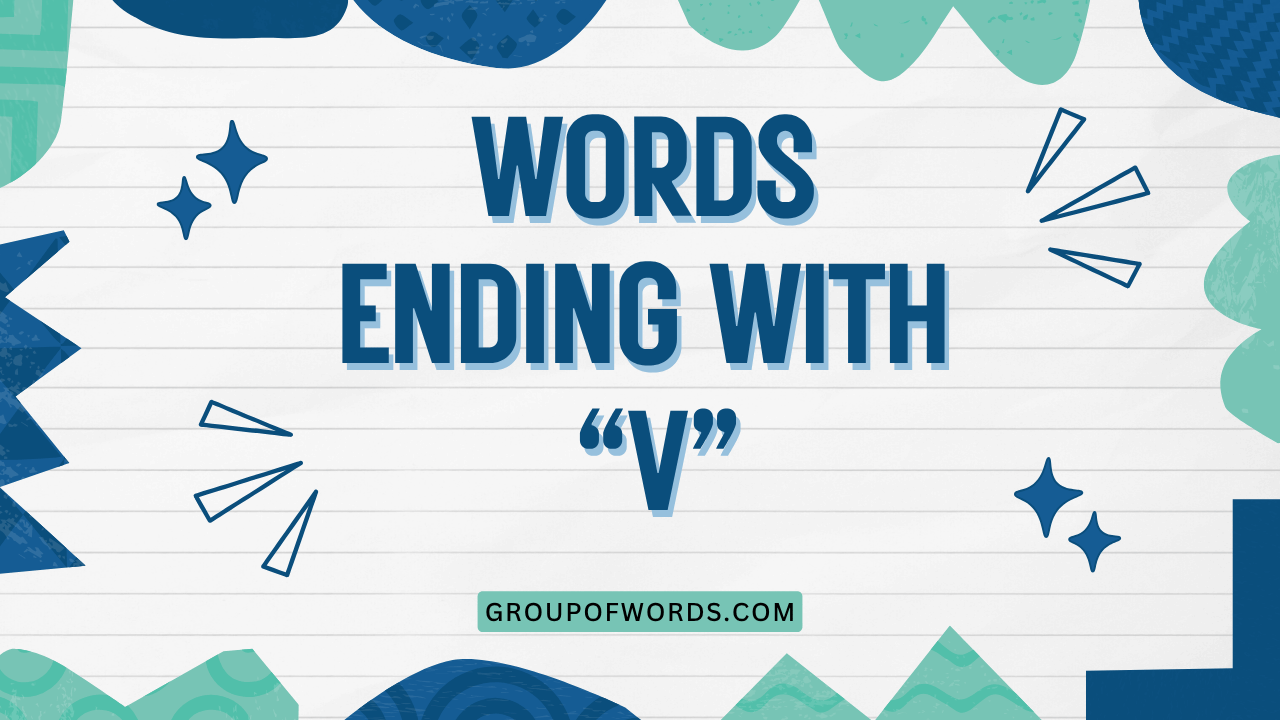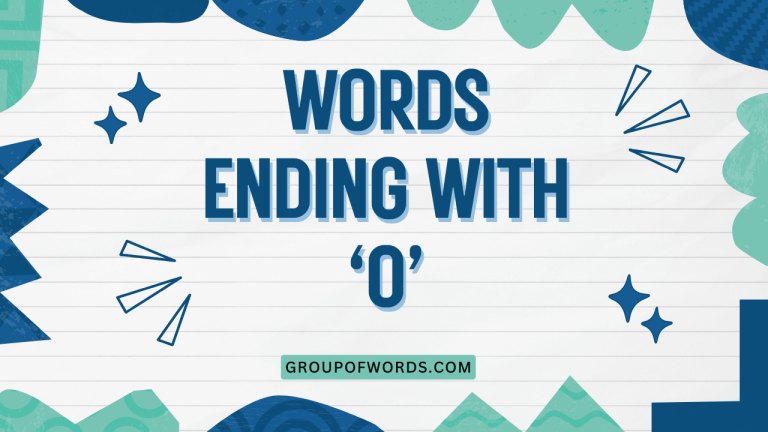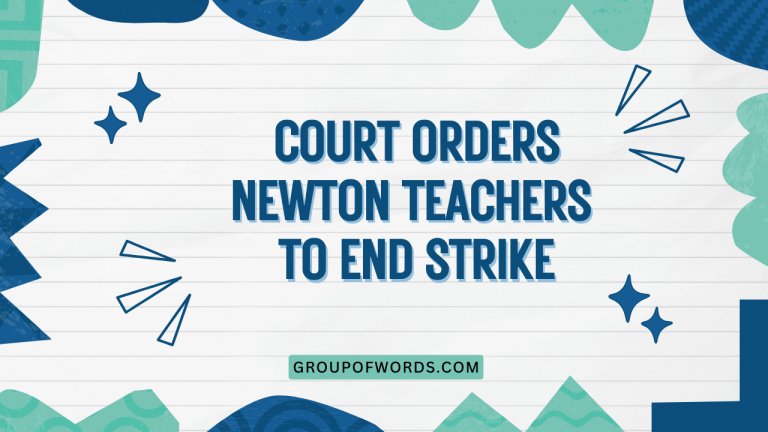Mastering Words Ending in ‘V’: A Comprehensive Guide
Understanding how words ending in ‘v’ function is crucial for mastering English grammar and vocabulary. These words, often verbs or nouns, follow specific patterns and rules that affect their spelling, pronunciation, and usage.
This comprehensive guide is designed to help learners of all levels, from beginners to advanced students, navigate the nuances of ‘v’-ending words, improving their writing, reading, and speaking skills.
Whether you’re preparing for an English exam, aiming to enhance your professional communication, or simply seeking to refine your language skills, this article will provide you with the knowledge and practice you need to confidently use words ending in ‘v’.
Table of Contents
- Definition of Words Ending in ‘V’
- Structural Breakdown
- Types and Categories
- Examples of Words Ending in ‘V’
- Usage Rules
- Common Mistakes
- Practice Exercises
- Advanced Topics
- FAQ
- Conclusion
Definition of Words Ending in ‘V’
A word ending in ‘v’ is any word in the English language whose final letter is the consonant ‘v’. These words can belong to various parts of speech, including verbs, nouns, adjectives, and even proper nouns.
The ‘v’ sound is a voiced labiodental fricative, meaning it’s produced by vibrating the vocal cords while air is forced through the space between the bottom lip and the top teeth. Understanding the function and context of these words is essential for accurate communication.
Words ending in ‘v’ often have specific grammatical roles and patterns. For example, many verbs ending in ‘v’ are involved in processes or actions, while nouns might represent objects or concepts.
The pronunciation and spelling of these words can also be influenced by the surrounding letters, especially when forming plurals or verb conjugations.
Structural Breakdown
The structure of words ending in ‘v’ can be broken down into the following components: the root word and the final ‘v’. The root word carries the primary meaning, and the ‘v’ contributes to the overall sound and grammatical function.
In some cases, the ‘v’ might be part of a suffix or ending that alters the word’s meaning or part of speech. For instance, the word “prove” is a verb, and its structure is simply the root “pro” followed by “ve”.
When forming plurals or verb conjugations, words ending in ‘v’ often follow specific rules. For example, some nouns ending in ‘f’ change the ‘f’ to ‘v’ before adding ‘es’ to form the plural (e.g., “leaf” becomes “leaves”).
This pattern demonstrates how the ‘v’ sound can interact with other letters to create different grammatical forms. Understanding these structural rules is crucial for correct spelling and grammar.
Types and Categories
Words ending in ‘v’ can be categorized based on their part of speech. Each category has its own specific characteristics and usage patterns.
Below are the primary categories of words ending in ‘v’.
Verbs Ending in ‘V’
Verbs ending in ‘v’ typically describe actions, processes, or states of being. They can be transitive (taking a direct object) or intransitive (not taking a direct object).
These verbs often follow regular conjugation patterns, but some may have irregular forms.
Nouns Ending in ‘V’
Nouns ending in ‘v’ represent people, places, things, or ideas. They can be concrete (tangible) or abstract (intangible).
The plural form of these nouns is usually formed by adding ‘s’, but there are exceptions.
Adjectives Ending in ‘V’
Adjectives ending in ‘v’ are less common than verbs and nouns. They are used to describe or modify nouns, providing additional information about their qualities or characteristics.
Adverbs Ending in ‘V’
Adverbs ending in ‘v’ are rare. They modify verbs, adjectives, or other adverbs, providing information about how, when, where, or to what extent something is done.
Proper Nouns Ending in ‘V’
Proper nouns ending in ‘v’ refer to specific people, places, or organizations. They are always capitalized and often follow specific naming conventions.
Examples of Words Ending in ‘V’
To illustrate the different categories of words ending in ‘v’, here are some examples organized by part of speech. These examples will help you understand how these words are used in context.
Examples of Verbs
Verbs ending in ‘v’ are common in the English language and are used to describe a wide range of actions and processes. The following table provides several examples of verbs ending in ‘v’, along with example sentences to illustrate their usage.
| Verb | Example Sentence |
|---|---|
| Give | Please give me the book. |
| Live | I live in New York City. |
| Have | I have a car. |
| Prove | Can you prove your theory? |
| Move | They move to a new house next month. |
| Love | I love spending time with my family. |
| Serve | The waiter will serve our table. |
| Observe | Scientists observe the behavior of animals. |
| Involve | The project will involve a lot of teamwork. |
| Believe | Do you believe in ghosts? |
| Remove | Please remove your shoes before entering. |
| Resolve | We need to resolve this issue quickly. |
| Revolve | The Earth revolves around the Sun. |
| Receive | Did you receive my email? |
| Achieve | She hopes to achieve her goals this year. |
| Perceive | How do you perceive the situation? |
| Deceive | He tried to deceive me with lies. |
| Relieve | This medicine will relieve your pain. |
| Strive | We must strive for excellence. |
| Devolve | The situation devolved into chaos. |
| Evolve | Species evolve over time. |
| Convince | He tried to convince me of his innocence. |
| Dissolve | Salt will dissolve in water. |
| Preserve | We need to preserve our forests. |
| Revive | The paramedics tried to revive the patient. |
Examples of Nouns
Nouns ending in ‘v’ are used to name people, places, things, and ideas. While less frequent than verbs, they are still an important part of the English vocabulary.
The following table provides examples of nouns ending in ‘v’ and their usage in sentences.
| Noun | Example Sentence |
|---|---|
| Drive | The drive to the beach took two hours. |
| Wave | I saw a large wave crashing on the shore. |
| Love | Love is a powerful emotion. |
| Curve | The road has a sharp curve ahead. |
| Sleeve | The button fell off my shirt sleeve. |
| Olive | I added some olives to the salad. |
| Archive | The historical documents are kept in the archive. |
| Representative | He is a representative of the company. |
| Motive | What was his motive for doing that? |
| Directive | The manager issued a new directive. |
| Native | She is a native of this town. |
| Resolve | He showed great resolve in the face of adversity. |
| Aggressive | His aggressive behavior is unacceptable. |
| Creative | She has a very creative mind. |
| Narrative | The book tells a compelling narrative. |
| Executive | He is an executive at a major corporation. |
| Positive | He maintained a positive attitude. |
| Perspective | From my perspective, it’s a good idea. |
| Relative | He is a relative of mine. |
| Conservative | He holds conservative views. |
| Locative | The term ‘here’ is a locative adverb. |
| Genitive | The possessive case is also known as the genitive. |
| Dative | In some languages, the dative case indicates the indirect object. |
| Accusative | The direct object is often marked by the accusative case. |
| Nominative | The subject of the sentence is in the nominative case. |
Examples of Adjectives
Adjectives ending in ‘v’ are less common but still appear in English. They are used to describe the qualities or characteristics of nouns.
Below is a table with examples of adjectives ending in ‘v’ and their usage in sentences.
| Adjective | Example Sentence |
|---|---|
| Alive | The patient is still alive. |
| Attentive | The student was very attentive in class. |
| Talkative | She is a very talkative person. |
| Creative | He is a creative artist. |
| Festive | The atmosphere was very festive. |
| Massive | The building is massive. |
| Submissive | The dog was very submissive. |
| Defensive | He became defensive when questioned. |
| Excessive | The price was excessive. |
| Invasive | That plant is an invasive species. |
| Illustrative | This example is illustrative of the point. |
| Relative | The cost is relative to the quality. |
| Positive | He has a positive attitude. |
| Negative | The test result was negative. |
| Attractive | She is a very attractive woman. |
| Competitive | The market is very competitive. |
| Progressive | The company has a progressive approach. |
| Sensitive | He is very sensitive to criticism. |
| Decisive | She is a very decisive leader. |
| Expensive | This car is very expensive. |
| Repressive | The regime was very repressive. |
| Impressive | The performance was very impressive. |
| Explosive | The situation is very explosive. |
| Abusive | His behavior was abusive. |
| Preventive | This is a preventive measure. |
Usage Rules
When using words ending in ‘v’, it’s important to follow specific usage rules to ensure clarity and grammatical accuracy. These rules cover aspects such as verb conjugation, noun pluralization, and adjective agreement.
For verbs, pay attention to the tense and subject-verb agreement. For nouns, ensure you use the correct singular or plural form.
For adjectives, make sure they agree in number and gender with the nouns they modify (if applicable in the language context).
Verb Conjugation: Regular verbs ending in ‘v’ follow standard conjugation patterns. Irregular verbs, however, have unique forms that must be memorized.
Noun Pluralization: Most nouns ending in ‘v’ form their plural by adding ‘s’. However, some nouns ending in ‘f’ change the ‘f’ to ‘v’ and add ‘es’ (e.g., “leaf” becomes “leaves”).
Adjective Agreement: In English, adjectives do not change form to agree with the nouns they modify. However, in other languages like French or Spanish, adjectives ending in ‘v’ must agree in gender and number with the noun.
Common Mistakes
Learners often make specific mistakes when using words ending in ‘v’. These mistakes can include incorrect spelling, improper verb conjugation, and misuse of plural forms.
Being aware of these common errors can help you avoid them.
Incorrect Spelling: Misspelling words ending in ‘v’, such as writing “beleive” instead of “believe,” is a common mistake.
Improper Verb Conjugation: Using the wrong verb tense or form, like saying “I haved” instead of “I have,” is another frequent error.
Misuse of Plural Forms: Incorrectly pluralizing nouns ending in ‘v,’ such as saying “oliveses” instead of “olives,” is also common.
Here are some examples of common mistakes and their corrections:
| Incorrect | Correct | Explanation |
|---|---|---|
| I beleive you. | I believe you. | Misspelling of “believe.” |
| She haved a car. | She has a car. | Incorrect verb conjugation. |
| The leaveses are green. | The leaves are green. | Incorrect plural form. |
| He gived me the book. | He gave me the book. | Incorrect past tense of “give.” |
| They moved to new house. | They moved to a new house. | Missing article before “new house.” |
Practice Exercises
To reinforce your understanding of words ending in ‘v’, here are some practice exercises. These exercises will test your ability to identify, use, and correct errors involving these words.
Exercise 1: Identifying Words Ending in ‘V’
Identify the words ending in ‘v’ in the following sentences.
| Question | Answer |
|---|---|
| 1. I want to give you a present. | give |
| 2. Do you believe in magic? | believe |
| 3. The drive to the mountains was beautiful. | drive |
| 4. She has a creative mind. | creative |
| 5. We need to resolve this issue quickly. | resolve |
| 6. He is still alive after the accident. | alive |
| 7. The olive oil is very tasty. | olive |
| 8. They move to a new city next year. | move |
| 9. I love spending time with my family. | love |
| 10. The wave crashed on the shore. | wave |
Exercise 2: Using Words Ending in ‘V’ in Sentences
Complete the following sentences using appropriate words ending in ‘v’.
| Question | Answer |
|---|---|
| 1. I ________ in a small town. | live |
| 2. Can you ________ your theory with evidence? | prove |
| 3. She wants to ________ her goals this year. | achieve |
| 4. Please ________ your shoes before entering the house. | remove |
| 5. The Earth ________ around the Sun. | revolves |
| 6. He tried to ________ me with lies. | deceive |
| 7. This medicine will ________ your pain. | relieve |
| 8. We must ________ for excellence in everything we do. | strive |
| 9. The situation ________ into chaos because of poor planning. | devolved |
| 10. Species ________ over long periods of time. | evolve |
Exercise 3: Correcting Errors with Words Ending in ‘V’
Identify and correct the errors in the following sentences.
| Question | Answer |
|---|---|
| 1. I beleive that he is honest. | I believe that he is honest. |
| 2. She haved a lot of experience in this field. | She has a lot of experience in this field. |
| 3. The leaveses fell from the trees. | The leaves fell from the trees. |
| 4. He gived me a book for my birthday. | He gave me a book for my birthday. |
| 5. They moved to new city last year. | They moved to a new city last year. |
| 6. I love to spending time outdoors. | I love spending time outdoors. |
| 7. She observe the stars through a telescope. | She observes the stars through a telescope. |
| 8. The project involve a lot of teamwork. | The project involves a lot of teamwork. |
| 9. Did you receive my email yesterday? | Correct. |
| 10. We need to resolve this problem imediately. | We need to resolve this problem immediately. |
Advanced Topics
For advanced learners, there are several complex aspects of words ending in ‘v’ to explore. These include the etymology of these words, their usage in idiomatic expressions, and their variations in different dialects of English.
Etymology: Understanding the origins of words ending in ‘v’ can provide insights into their meanings and usage. Many of these words have Latin or French roots.
Idiomatic Expressions: Words ending in ‘v’ often appear in idiomatic expressions, where their meaning may differ from their literal definitions. For example, “give up” means to quit, which is different from the individual meanings of “give” and “up.”
Dialectal Variations: The pronunciation and usage of words ending in ‘v’ can vary across different dialects of English. Being aware of these variations can help you understand and communicate with speakers from different regions.
FAQ
Here are some frequently asked questions about words ending in ‘v’.
- Why do some nouns ending in ‘f’ change to ‘v’ in the plural form?
This pattern is due to historical phonetic changes in English. The ‘f’ sound used to be voiced (similar to ‘v’) in certain contexts, and this voicing was preserved in the plural forms of some nouns.
- Are there any adjectives that commonly end in ‘v’?
While not as common as verbs or nouns, adjectives like “alive,” “attentive,” and “creative” are examples of adjectives ending in ‘v’.
- How can I improve my spelling of words ending in ‘v’?
Practice, memorization, and using spelling tools can help. Pay attention to common mistakes and focus on the specific spelling rules for these words.
- What is the difference between “believe” and “belief”?
“Believe” is a verb that means to accept something as true, while “belief” is a noun that refers to a state of mind where something is accepted as true.
- How do I know when to use the correct tense of a verb ending in ‘v’?
Understanding the context of the sentence and the time frame you’re referring to is crucial. Pay attention to time markers and use the appropriate verb tense accordingly.
- Are there any irregular verbs that end in ‘v’?
Yes, the verb “give” is an irregular verb. Its past tense is “gave,” and its past participle is “given.”
- Why are adverbs ending in ‘v’ so rare?
Adverbs are often formed by adding “-ly” to adjectives, and this suffix is not typically added to words ending in “v” to create adverbs. Instead, other adverbial forms or phrases are used.
- Can proper nouns ending in ‘v’ have any significance?
Yes, proper nouns ending in ‘v’, such as geographical names or surnames, can have historical or cultural significance, reflecting the origins and traditions of the people or places they represent.
Conclusion
Mastering words ending in ‘v’ is a key step in improving your English language skills. By understanding the different categories of these words, following the usage rules, and avoiding common mistakes, you can communicate more effectively and confidently.
This comprehensive guide has provided you with the knowledge and practice you need to succeed.
Continue to practice using words ending in ‘v’ in your writing and speaking. Pay attention to how native speakers use these words and don’t be afraid to ask questions when you’re unsure.
With dedication and effort, you can master this aspect of English grammar and enhance your overall language proficiency.






